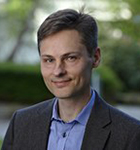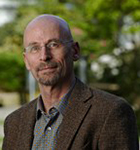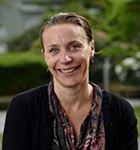23,3 million DKK for UCPH research into the workings of the brain, Europe and financial transactions
Research into how the brains recognises what we see. Research into the pros and cons of taxes on financial transactions. And research into how new, emerging super powers in the world look at Europe. These are the topics that three UCPH researchers from the Faculty of Social Sciences will dive into in the coming year with robust support from the Danish Council for Independent Research.
Three researchers from the Faculty of Social Sciences at UCPH are among the guests of honor when the Council for Independent Research awards almost 200 million Danish kroner to recipients of the much sought after Sapere Aude funds.
Professor of Anthropology Oscar Salemink and professor of Economics Peter Norman Sørensen each receive 'Top Researcher' funds, and associate professor of psychology Randi Starrfelt receives funds in the category 'Research leader'. These three researchers are awarded about 23 million Danish kroner, which will allow them to focus on their respective areas of research for the next four to five years.
The latin name of this award; 'Sapere Aude', means 'Dare to know', and each year it is awarded by the Danish Council for Independent Research to a number of Denmark’s most prominent researchers in the areas of health, natural science, technology as well as in humanities and social sciences.
The funds are awarded for specific, time-limited research activities that, it is believed, can contribute with significant new knowledge. The research projects are born from the researchers’ own ideas, and the scientific quality of the projects are the most important criteria when selecting the recipients of Sapere Aude funds.
New light on taxes on financial trade

Peter Norman Sørensen. Photo: Tariq Khan
The 'Top Researcher' award gives Peter Norman Sørensen, professor at the Department of Economics, a chance to ask and examine the question if taxes on financial trade do more good than harm, and if the revenue from the taxes can contribute to improving the level of welfare in society.
- In the financial markets it is quite common for the dealers to have different information about the stocks they buy and sell. This can limit the individual dealer: Who would want to buy a stock from someone who knows something bad about the value of the stock? Among other things, we want to examine if taxes on financial transaction can lead to more homogenous information on the stock market, and thus reduce the risk of doing trade that turns out to be unfavorable, says Peter Norman Sørensen.
The 'top researcher' funding awarded to professor Oscar Salemink at the Department of Anthropology is to generate new knowledge on how new superpowers like Japan, Brazil, China, India and South Africa look at Europe, and this will bring the researchers to look at the past as well as into the future.

Oscar Salemink. Photo: Tariq Khan
- Europe started defining itself as an independent continent over the 16th and 17th centuries, when Europeans traveled to Africa, Asia and America, and brought objects home with them. The objects from 'the new world' were exhibited in museums, and became the basis for forming a view of the world in which Europe had a leading position. Now Europe is losing its leading position, and other countries are starting to classify the world differently, no longer with Europe at the center. In this research project we will look at a near future in which Europe no longer defines itself, but is increasingly defined by other regions, says Oscar Salemink.
The research project ‘Global Europe’ is carried out by a team of researchers, and Oscar Salemink will himself be in charge of the part of the project taking place in China.
Why do you recognise your neighbour?

Randi Starrfelt. Photo: Tariq Khan
The research in the area of psychology will also be boosted by funding from from the Danish Council for Independent Research this year. Associate professor Randi Starrfelt receives funding in the category 'Research leader', and will now spend the next four years defining how we humans recognise faces, objects and written words in the 'Back of the Brain' research project.
- The project is about how we recognise what we see. How do we know it is our neighbor (and not someone else) we see in a picture in the newspaper? How do we recognise our own car in the parking lot? An how come reading is easy for most of us once we have learned it? This is what we will examine in a large group of people to see if there is a systematic connection between how good we are a recognizing people, things and text, explains Randi Starrfelt.
Randi Starrfelt will examine if learning affects the structures of the brain so that special areas form for a learned behavior like reading.
- And if so, if this learning affects other processes in the brain so that we get better – or worse – at recognising other things like faces or objects, she says. Randi Starrfelt also received funding from the Danish Council for Independent Research in 2012 in the 'Sapere Aude Young Researcher category'.
Traditionally research into reading and research into how people recognise objects and persons have been separate research disciplines, and typically researchers have focused on either persons with a brain damage or healthy persons. Randi Starrfelt’s research projects will be the first to get the full picture, by examining both reading and the ability to recognise faces and object in a large groups of test persons with or without brain damage, in order to get a clear picture of how the processes work.
- If we understand how learning to read alters the brain, it will allow us to better understand how learning in general alters the brain. It is not that the brain grows when we learn new skills, so there must be some kind of re-organisation taking place allowing us to learn new skills. What we are trying to find out is whether this re-organisation has a 'prize', and how a learned function – like being able to read – is affected by brain damage, says Randi Starrfelt.
This year, a total of 26 Danish researchers receive Sapere Aude funding for a total of 195,5 million Danish kroner. And this year Peter Norman Sørensen and Oscar Salemink are the only researchers in social sciences to receive funding in the highest category, 'Sapere Aude Top Researcher'.
There were almost 300 applicants for funding this year, and among the 26 recipients there was a total of nine UCPH researchers. Other than the three researchers from the Faculty of Social Sciences at UCPH, one UCPH researcher from the Faculty of Health and Medical Sciences, and five UCPH researcher at the Faculty of Science received funding from the council.
ContactPeter Norman SørensenProfessor, cand. scient. oecon.
Telephone: +45 3532 3056
E-mail: peter.sorensen@econ.ku.dk
Oscar Salemink
Professor of Anthropology
Telephone: +45 3532 4472
E-mail: o.salemink@anthro.ku.dk
Randi Starrfelt
Associate professor, cand.psych., ph.d.
Specialist of clinical neuropsychology
Telephone: +45 3532 4886 or +45 2679 7390
E-mail: randi.starrfelt@psy.ku.dk
Related News
Contact
Peter Norman Sørensen
professor, cand. scient. oecon.
Telephone: +45 3532 3056
E-mail: peter.sorensen@econ.ku.dk
Oscar Salemink
Professor of Anthropology
Telephone: +45 3532 4472
E-mail: o.salemink@anthro.ku.dk
Randi Starrfelt
Associate professor, cand.psych., ph.d.
Specialist of clinical neuropsychology
Telephone: +45 3532 4886 or
+45 2679 7390
E-mail: randi.starrfelt@psy.ku.dk
Communication consultant
Janni Brixen
Phone: +45 9356 5257
E-mail: jab@samf.ku.dk
Read more about the resarchers
Oscar Salemink:
- presentation of Oscar Salemink on the councils website
- Oscar's UCPH research profile
Peter Norman Sørensen:
- presentation of Peter Norman Sørensen on the councils website
- Peter's UCPH research profile
Randi Starrfelt:
- presentation of Randi Starrfelt on the councils website
- Randi's UCPH research profile
Facts
about the Danish Council for Independent Research
- awards funding for about one billion kroner each year and support about 600 research projects based on the researchers’ own ideas.
- supports specific, time-limited research activities. Scientific quality is the most important selection criteria.
- the funding is offered in free national competition with no thematically restriction.
- advisor to the Minister of Higher Education and Science, the Parliament and the government in questions pertaining to research.
